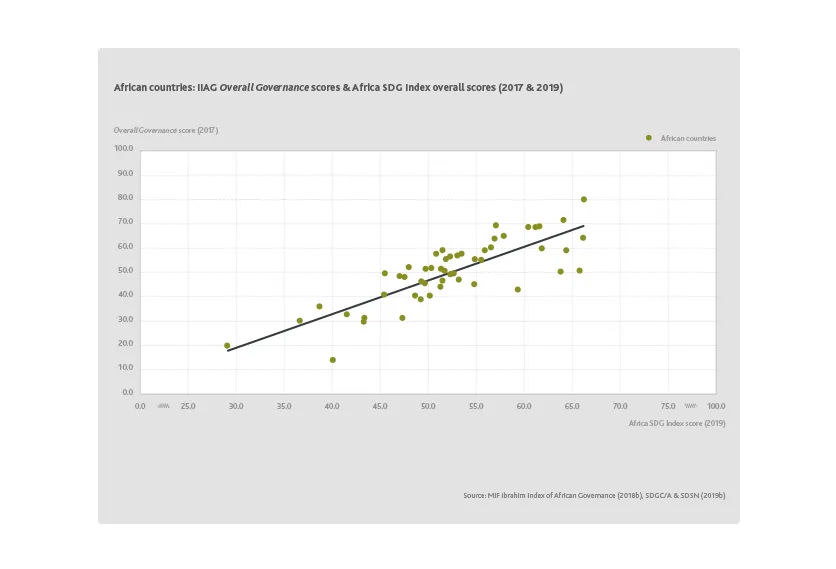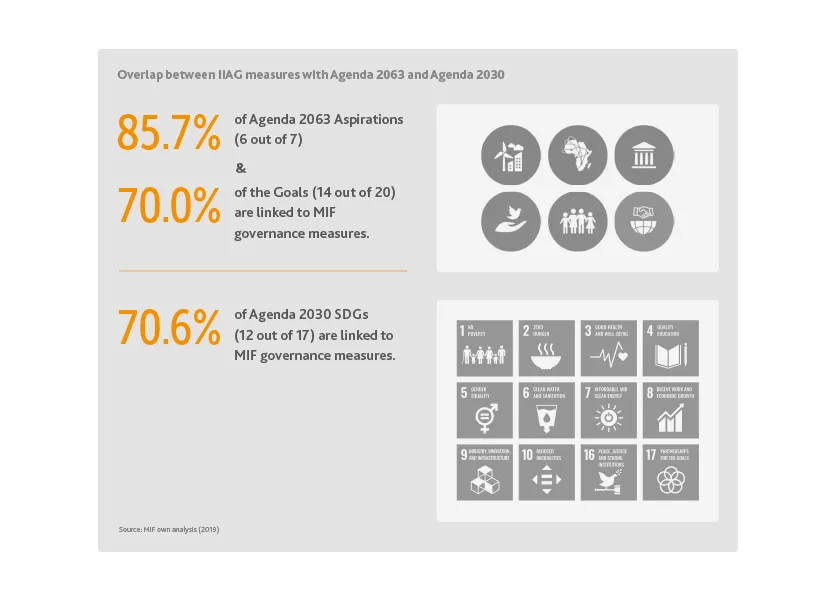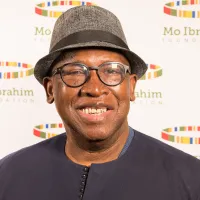Three key insights from the IIAG about Agenda 2063 targets and SDGs
14 November, 2019
In January 2014, we received an email detailing a bold plan for Africa’s future; Agenda 2063. This was a blueprint for transforming the continent, asking all citizens and stakeholders to act now to shape the future we want for Africa; an optimistic and exciting juncture filled with hope for the continent’s vision for itself. This transformative development framework, along with the United Nations’ Agenda 2030 and its Sustainable Development Goals (SDGs) now pave the way for Africa’s development agenda.
At this critical time where Africa prepares to enter the last decade of the 2030 Agenda for Sustainable Development and is halfway through the First Ten-year Implementation Plan of Agenda 2063, I am presenting in this blog, some key insights that can be drawn from the Ibrahim Index of African Governance (IIAG) about these agendas.
The Foundation has always campaigned for Afro-realism, an appreciation of the continent based on facts rather than on narratives that tend to be overly pessimistic or optimistic. As the largest source of data on African governance, the IIAG is a key tool for African countries to measure the environment around achieving these frameworks. The last IIAG dataset measures overall governance for 54 African countries across a ten-year comparable time series (2008-2017) for 14 sub-categories and four categories and contains around 150,000 data points in total. This wealth of information is integral to understand the continent’s trajectory towards improving outcomes for citizens.
Firstly, analysis in the new African Governance Report reveals the centrality of governance performance to achieve the targets and goals of Agenda 2063 and Agenda 2030. All three frameworks – the IIAG, Agenda 2063 and Agenda 2030 – have in common a citizen-centred approach that is the essence of governance. For example, using data from the Africa SDG Index and the IIAG we see a strong correlation (r=+0.82) between overall country progress towards the SDGs and Overall Governance scores. Unsurprising that both indices have some data overlap, 82.5% of indicators on the Africa SDG Index do not feature in the IIAG.

Secondly, the IIAG framework has key overlapping themes with Agenda 2063 and Agenda 2030. The highest degree of overlaps are in the areas of access to and quality of education; health and nutrition; equal treatment of women and youth inclusion; security, justice and strong institutions; and prosperity and economic opportunity.

Thirdly and finally, drawing from the IIAG, the African Governance Report identifies amongst these cross-cutting themes factors that are associated with their performance. Correlations between measures in the IIAG provide unique insights into potential areas for improvement, highlighting where policy efforts should be focussed to tackle governance challenges. For example, Access to Electricity shows a strong correlation to performance in both Health and Education. In the case of the theme Prosperity and Economic Opportunity, the Report advises governments to look at diversifying economies, accelerating progress in infrastructure – specifically physical transport, electricity and ICT – increasing investment in the rural sector, and strengthening regional integration, to make efficient progress.
Effective implementation of Agendas 2063 and 2030 is dependent on the ability of African governments to monitor progress, adapt resources and policies as needed. As advocates of Afro-realism, using data to track progress in African governance is crucial. The wealth of information a tool like the IIAG provides is insightful in this regard.
As the Foundation’s Chair, Mo Ibrahim, said:
Africa’s leaders and decision-makers should act now on crucial areas affecting the continent. As we look towards critical deadlines such as the Sustainable Development Goals and the Agenda 2063, progress in governance will remain central to achieving a prosperous and peaceful future. The IIAG is a key data tool that provides a dashboard that highlights focus areas for governments. Without an effective measurement framework in place, assessing and monitoring progress towards the two development Agendas is highly compromised.



